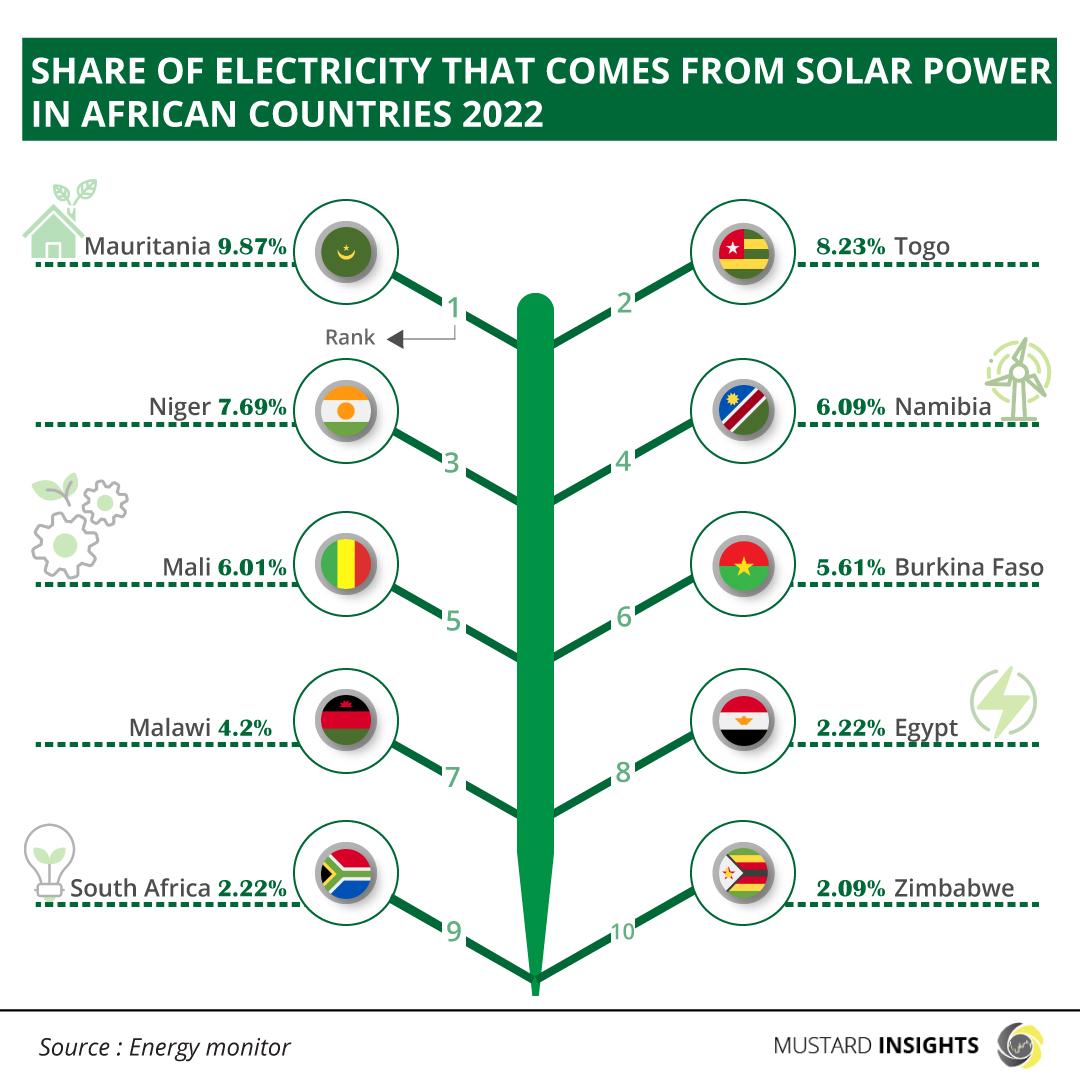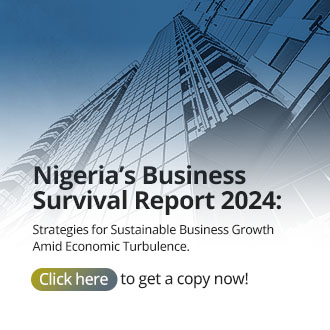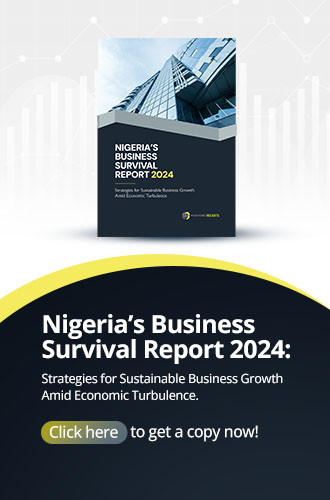Major African countries are looking to tackle electricity access issues by increasing renewable-based generation capacity.

Africa has a vast range of energy resources at its disposal, ranging from sources of hydrocarbons (natural gas, oil, and coal) to other forms of renewable energy (wind, biomass, and solar). Fossil fuels remain the main source of electricity generation on the continent, responsible for around 334 terawatt hours (TWh) of its electrical energy.Next to this are renewable energies; in 2021, Africa saw 9 percent of all energy generated come from renewable sources, with a strong reliance (6.8 percent) on hydropower.
Africa has seen marginal growth in its renewable energy share of electrity generation. Renewables as a a whole saw a growth rate of 21% between 2010 and 2020 and a current total renewable capacity of more than 58 GW. Solar and wind capacity increased on the continent by 13 percent and 11 percent, respectively, while hydropower soared by 25 percent.
While there have been improvements towards accessibility of electricity in Sub-Saharan Africa – electricity access figures rose from 33% in 2010 to 46% in 2019 – 570 million people still lacked access to electricity in 2019. and as at 2020, had an access rate of below 50% in 24 African countries, per the World Bank. Africa is yet to tap into the abundance of its energy resources or reach its goal of universal access to modern energy sufficient for its people and businesses.
Breakdown of Africa's Renewable Energy Potential
Hydropower
Hydropower is the most efficient source of renewable energy in Africa due to the presence of large rivers, which have an average annual discharge of 17.7 cubic meters per second. Hydropower accounts for 17% of the electricity generated across Africa and remains one of the lowest-cost sources of electricity. Currently, only 11% of its hydropower potential has been utilized, with the capacity of generating 37,251MW.
Ethiopia, Ghana, Malawi, South Africa, the Democratic Republic of Congo, Mozambique, Nigeria, Uganda, and Zambia are some of the largest producers of hydropower in Africa, while Ethiopia is currently building a mega-dam, the 6GW Grand Ethiopian Renaissance Dam, which will be the largest in Africa in terms of capacity when it enters into operation. Nigeria, Angola, and Mozambique are also constructing hydropower facilities to cater to their growing population.
Solar Energy
Africa has the greatest potential for generating solar power in the world today. It is also the fastest-growing renewable energy source in Africa. The continent receives annual average solar irradiation of 2,119 kilowatt hours per square meter (kWh/m2), with most countries across North, West, and Southern Africa receiving an average above 2,100 kWh/m2 annually.
Africa's present solar capacity is estimated at 9,604 MW, while 7,158 MW is under construction. South Africa and Egypt currently have the largest solar capacity, accounting for over three-quarters of installed solar capacity in 2020, followed by Algeria.
Wind Energy
Wind is one of the more under-exploited renewable energy sources in Africa. It can generate more than 59 TW; however, capacity from projects under construction and currently installed (6,491 MW) have only tapped into 0.01% of this potential. North and Southern African countries have the highest potential of utilizing wind energy, with the wind reaching 7 meters per second (m/s). South Africa, Morocco, Egypt, Kenya, Ethiopia, and Tunisia together account for over 95% of Africa's total wind generation capacity.
Nuclear Energy
Nuclear energy is a form of energy released from the nucleus of atoms, the core comprised of protons and neutrons. This energy source can be produced in two ways: fission – when nuclei of atoms split into several parts – or fusion – when nuclei are fused.
Few countries have started experimenting with nuclear energy in Africa; South Africa currently has the continent's only commercial nuclear user. The Koeberg Nuclear Power Station is generating 1,940 MW in South Africa, while another 100 MW is under construction in South Sudan. Ghana, Kenya, Egypt, Morocco, Niger, and Nigeria are considering adopting nuclear power and have engaged with the IAEA to assess their readiness to embark on a nuclear program. Countries such as Algeria, Tunisia, Uganda, and Zambia are also evaluating the feasibility of nuclear power.
Bio-Energy
Biopower technologies convert renewable biomass fuels (agricultural products or solid waste) into heat and electricity using processes like fossil fuels. There are three ways to harvest the energy stored in biomass to produce biopower: burning, bacterial decay, and conversion to a gas or liquid fuel.
Africa has a plethora of bioenergy networks and can easily adopt bioenergy technologies into its services. After all, bio-energy is already a major energy source in most rural communities. Demand for modern energy services in 2050 is estimated that more than 10% of Africa's renewable energy supply will come from biomass. Africa's bioenergy capacity is estimated at 1,709 MW, while 151 MW is still under construction.
Geothermal Energy
Geothermal energy utilizes steam or heat from the earth to produce electricity. The steam is generated via hot water reservoirs found a few meters beneath the earth's crust. It is often used to power heating and cooling systems.
Countries in East Africa are successfully harnessing their geothermal capabilities with installed geothermal capacity estimated at 824 MW in Ethiopia, while a further 3,953 MW is under construction in Ethiopia, Kenya, and Uganda. Kenya is the largest geothermal energy producer in Africa, with its power production contributing approximately 40% of the country's electricity supply.
Why Is Africa Not Reaching Its Potential
With access to all these energy resources, one would wonder why Africa is not leading the world in energy production and technological advancements. A few reasons may explain why Africa is not reaching its energy potential, ranging from its policies to investment among others. However, one major factor Africa is not reaching its potential is because of its abundance of fossil fuels.
Africa's economy and energy generation are largely tied – to an extent - to fossil fuels. Crude oil is the second-most widely used source of primary energy on the continent, which, given its abundance and advanced technology, is unavoidable. Nigeria, Algeria, Angola, and Libya are among the world's 20 largest oil producers, while Algeria, Egypt, and Nigeria are among the world's 20 largest natural gas producers. Egypt, Mozambique, Senegal, South Africa, and the United Republic of Tanzania, among others, accounted for over 40% of global gas discoveries between 2011 and 2018.
Natural gas is also the fastest-growing energy source in Africa's power sector, increasing at a cumulative annual growth rate of 4.2% per year from 2011 to 2019. Several African countries are also coal producers, including Botswana, Mozambique, South Africa, and Zimbabwe, with South Africa being the largest. Coal, natural gas, and oil together account for about 77% of Africa's total electricity generation as of 2019. Africa's largest electricity-consuming economies – South Africa, Egypt, Algeria, and Nigeria – drive these trends, with most of the continent's coal supply going to South Africa.
All these countries have some of the best-performing economies in Africa, and these economies depend on fossils fuel for sustainability.
How Are African Countries Going to Perform This Year?
According to an analysis conducted by Energy Monitor - which determined the share of electricity that may come from solar energy in 2022 - Mauritania is on pace to derive a major share of its electricity generation from solar, with 9.87% of the total electricity supply in the country projected to be generated.
Mauritania's Sheikh Zayed Solar Power Plant facility accounts for 10 percent of Mauritania's grid capacity. It is a 15-megawatt photovoltaic facility in Nouakchott, the country's capital. It was one of the largest solar power installations in Africa and produced 25,409 megawatt-hours of clean electricity annually, displacing about 21,225 tonnes of carbon dioxide annually. Other countries include:
Togo placed second on the list, with 8.23% of its electricity needs estimated to be generated from solar energy.
Niger ranked third on the list, with 7.69% of its electricity demands estimated to be generated from solar energy.
Namibia placed fourth on the list, with 6.09% of its electricity needs estimated to be generated from solar energy.
Mali placed fifth, with 6.01% of its electricity needs estimated to be generated from solar energy.
Burkina Faso, Malawi, Egypt, South Africa, and Zimbabwe also improving their solar share, with Burkina Faso having the highest share of electricity to be generated from electricity.
Takeaway
Africa has made great strides over the past decade in expanding access to energy, but more needs to be done. Africa needs to be more intentional about transitioning from fossil fuel to renewables by enforcing the policies and goals set for renewable energy. African leaders should also create an enabling environment for accelerated development of energy transition solutions in Africa.
Financing solutions should also be taken seriously. According to PwC estimates, it would cost Africa around $2.8tn to reach a net-zero energy mix by 2050. This would include annual costs of circa $33bn between 2020 and 2030; $111bn between 2030 and 2040; and $142bn between 2040 and 2050, which is not that farfetched for Africa to achieve.
Thoughts?
We won't share your email address. All fields are required.
